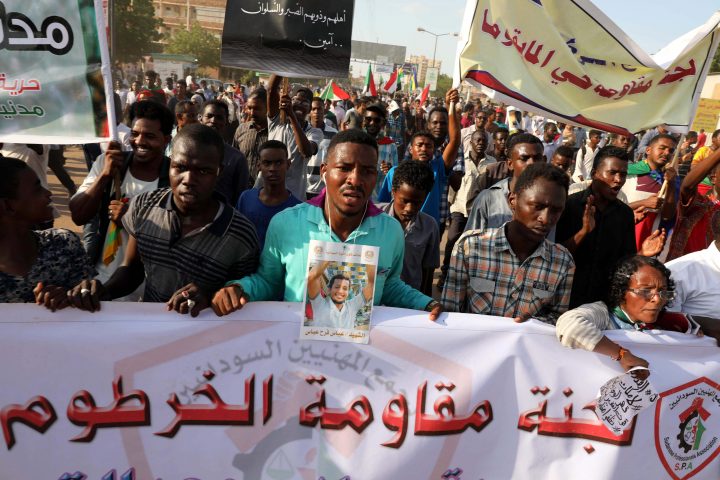Thousands of demonstrators took to the streets throughout Sudan on Monday to call for disbanding former President Omar al-Bashir’s party, the political organ he used to control the country during his 30 years of autocratic rule before being ousted in April.

Separately, Sudan’s transitional government and a main rebel faction signed a political declaration amid peace negotiations that began last week, taking a new step toward ending the country’s yearslong civil wars. The two sides also renewed a nationwide cease-fire for three months.
The protests in Khartoum and other parts of the country coincided with the anniversary of an uprising in 1964. That push ended six years of military rule in Sudan following a wave of riots and strikes.
READ MORE: Sudanese PM names commission to probe killings at June sit-in
Monday’s protests renewed demands to step up an independent investigation into the deadly break-up of a protest camp in June, which resulted in dozens of causalities among the protesters.
Police blocked off main streets Monday leading to the presidential palace and the military’s headquarters in Khartoum — the site of June’s deadly dispersal — ahead of the marches, according to Asil Abdu, an activist and a resident of the capital.

A statement by the police warned against “creating a state of chaos,” which it said could lead to “unfavourable consequences.”

Get breaking National news
The military has also instructed protesters to stay away from its headquarters in Khartoum and other military sites across the country.
Videos circulated online show protesters marching in Khartoum and its twin city of Omdurman. Protests also broke out in other cities such as Atbara, the northern transport hub where the uprising began in December.

The protesters demanding al-Bashir’s National Congress Party be disbanded were called for by the Sudanese Professionals’ Association, which spearheaded the uprising against the former president.
The SPA has called for the appointment of regional governors and the formation of a legislative body. Creating that interim parliament was part of an August power-sharing agreement signed between the pro-democracy protesters and the country’s powerful military.
The transitional government had previously said it won’t appoint governors and the legislative body until after achieving peace with the country’s rebel groups. That would be a crucial step, since the transitional government is looking to slash military spending in order to revive the battered economy. The uprising against al-Bashir initially began against economic issues, but escalated into calls for his downfall.
Mohammed Hassan al-Taishi, a member of the Sovereign Council and a government negotiator, said Monday that they had agreed on the agenda for the negotiations with the Sudan Revolutionary Front, an alliance of rebel groups from the western Darfur region.
READ MORE: Explained: Sudan’s deadly unrest, blue profile pictures and criticism of apathy
“There is a new political will from all sides … to reach permanent and comprehensive peace,” SRF leader Yasser Arman told The Associated Press by phone.
He said this was the first time in five years that the sides agreed to a joint cease-fire. In another first, he said the government agreed to allow humanitarian aid deliveries into conflict-affected areas, both from inside and from outside Sudan.
- Bill Gates ‘regrets’ ever knowing Epstein, ex-wife Melinda recalls ‘muck’ in marriage
- Canada has no nuclear weapons. After Trump’s Greenland threats, should it?
- Washington Post layoffs include entire Ukraine, Middle East bureaus
- Savannah Guthrie posts message to her mother’s kidnapper asking to provide proof she is alive
The talks are taking place in Juba, the capital of South Sudan, which itself gained independence from the north in 2011 after years of fighting.
The transitional authorities have set a six-month deadline for making peace with the rebel groups.
READ MORE: Sudan, rebel groups set to begin peace talks — Here’s what you should know
The report identified important steps the government should take, including “reverse the imposition of Islamic law on religious minorities, separate religion and state, and provide for a fairer distribution of power and resources to areas in the periphery.”







Comments